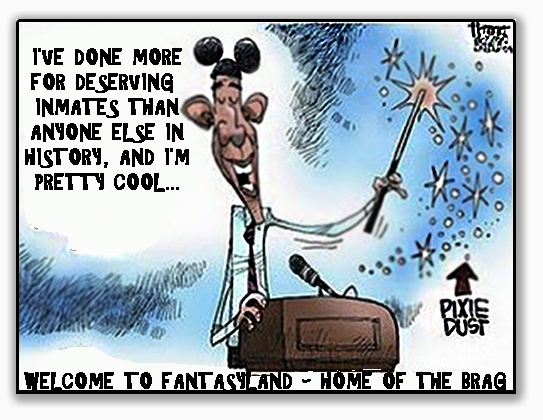We’re still doing a weekly newsletter… we’re just posting pieces of it every day. The news is fresher this way…
 MERCY ME
MERCY ME
Commentators are growing increasingly weary of the Obama Administration’s self-adulation over the President’s clemency efforts, even as advocates become more frantic over the fact that come January 20th, the guy who last summer called clemency recipients “bad dudes” and warned one audience that “they’re walking the streets – sleep tight, folks,” will become President of the United States.
 One advocate wrote last week that
One advocate wrote last week that
there’s something disingenuous in the now-familiar rhetoric peddled by the White House with every clemency announcement, which repeatedly tells us we are a ‘nation of second chances’. Even within the narrow scope of Obama’s clemency initiative — and putting aside his treatment of immigrants and whistleblowers — this is wishful thinking at best. As Obama himself has written in his congratulatory letters to clemency recipients, ‘thousands of individuals have applied for commutation, and only a fraction of these applications are approved.’ Before the latest round of pardons and commutations, Obama had rejected nearly 14,000 clemency applications. On the Department of Justice website, which tracks the rejections, the staggering list of names includes Ferrell Scott, whose application was denied on November 29. Scott is serving life with parole for pot offenses — precisely the kind of draconian sentence clemency exists to address.
We’ve previously complained that if an inmate fits into Obama’s clemency criteria – which themselves seem somewhat arbitrary – all he or she has done is to buy a lottery ticket. Consider the case of Alice Marie Johnson, a mother of five sentenced to life for a crack conspiracy in the 1990s. During her two decades in prison, she’s become an ordained minister and a mentor to young women. She has a job lined up upon release. Her daughter has collected over 100,000 signatures on a petition for clemency. Were she sentenced today for the same offense that got her life, her sentence would be substantially shorter. Yet she has been overlooked.
 There’s no shortage of people on the potential pardon list. Besides the usual candidates – Edward Snowden, Hillary Clinton and Chelsea (nee Bradley) Manning – the efforts to obtain a pardon for Sholom Rubashkin, a Brooklyn-born rabbi who was sentenced to 27 years for bank fraud have increased. Last month, the Wall Street Journal editorialized for a pardon. This week, former deputy attorney general Phil Heymann joined the chorus in the Washington Post:
There’s no shortage of people on the potential pardon list. Besides the usual candidates – Edward Snowden, Hillary Clinton and Chelsea (nee Bradley) Manning – the efforts to obtain a pardon for Sholom Rubashkin, a Brooklyn-born rabbi who was sentenced to 27 years for bank fraud have increased. Last month, the Wall Street Journal editorialized for a pardon. This week, former deputy attorney general Phil Heymann joined the chorus in the Washington Post:
Rubashkin, a 57-year-old father of 10, has already served seven years for the crime, which ordinarily merits no more than three years. Worse, his sentence was based on perjured testimony and prosecutorial misconduct.
If even a few highly respected prosecutors think a particular case was handled unjustly, resulting in a vastly excessive sentence, the department’s representatives should be prepared at least to discuss the reasons. In Rubashkin’s case, 107 former Justice Department officials, including five former attorneys general, six former deputy attorneys general (myself included), two former FBI directors, 30 former federal judges and other leading jurists, have sought to meet with senior officials of the department we once served. The only response: a form letter from an assistant attorney general stating that no meeting could take place while Rubashkin was also pursuing his case in court.
The foregoing raises some troubling concerns. First, if 100,000 signatures on a petition, an exemplary prison record, and a sympathetic inmate aren’t enough to get the Obama administration to grant clemency, then the system is truly a crapshoot. Second, if a 57-year old rabbi whose conviction is so shaky that over a hundred cops and prosecutors call for executive clemency gets ignored, then it’s pretty clear that no one but a drug offender will ever qualify for commutation under this Administration.
 Still, the Administration promises more to come. One report predicted that we could “expect to see most pardons and the like in the month ahead focused on more non-violent drug offenders. There’s no shortage of such people incarcerated in U.S. prisons, so there are thousands of potential choices for Obama’s team to sift through by mid-January.”
Still, the Administration promises more to come. One report predicted that we could “expect to see most pardons and the like in the month ahead focused on more non-violent drug offenders. There’s no shortage of such people incarcerated in U.S. prisons, so there are thousands of potential choices for Obama’s team to sift through by mid-January.”
As for Ms. Johnson, she believes that “the President has made an incredible push at helping to right the wrongs of our criminal justice system. I applaud him and hold out hope for me and thousands of others who face lifelong sentences for nonviolent crimes. But with the historic Obama administration coming to an end, this could be a last chance at freedom for me and for many others — so I also hope he moves quickly. I hope his administration will process all the applications for clemency currently waiting for the President’s review.”
The Intercept, Obama’s Clemency Problem – And Ours (Dec. 24, 2016)
Care2.com, Pardon Me? Who Obama May Pardon in His Last Month (Dec. 28, 2016)
Washington Post, 107 former Justice officials think this case was handled unjustly. DOJ must act. (Dec. 26, 2016)
Wall Street Journal, Obama Should Pardon This Iowa Kosher-Food Executive (Nov. 27, 2016)
CNN, Clemency seeker to Obama: please don’t forget us (Dec. 28, 2016)

